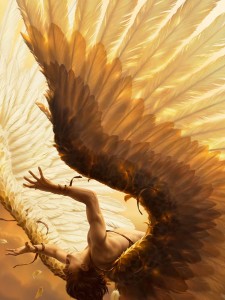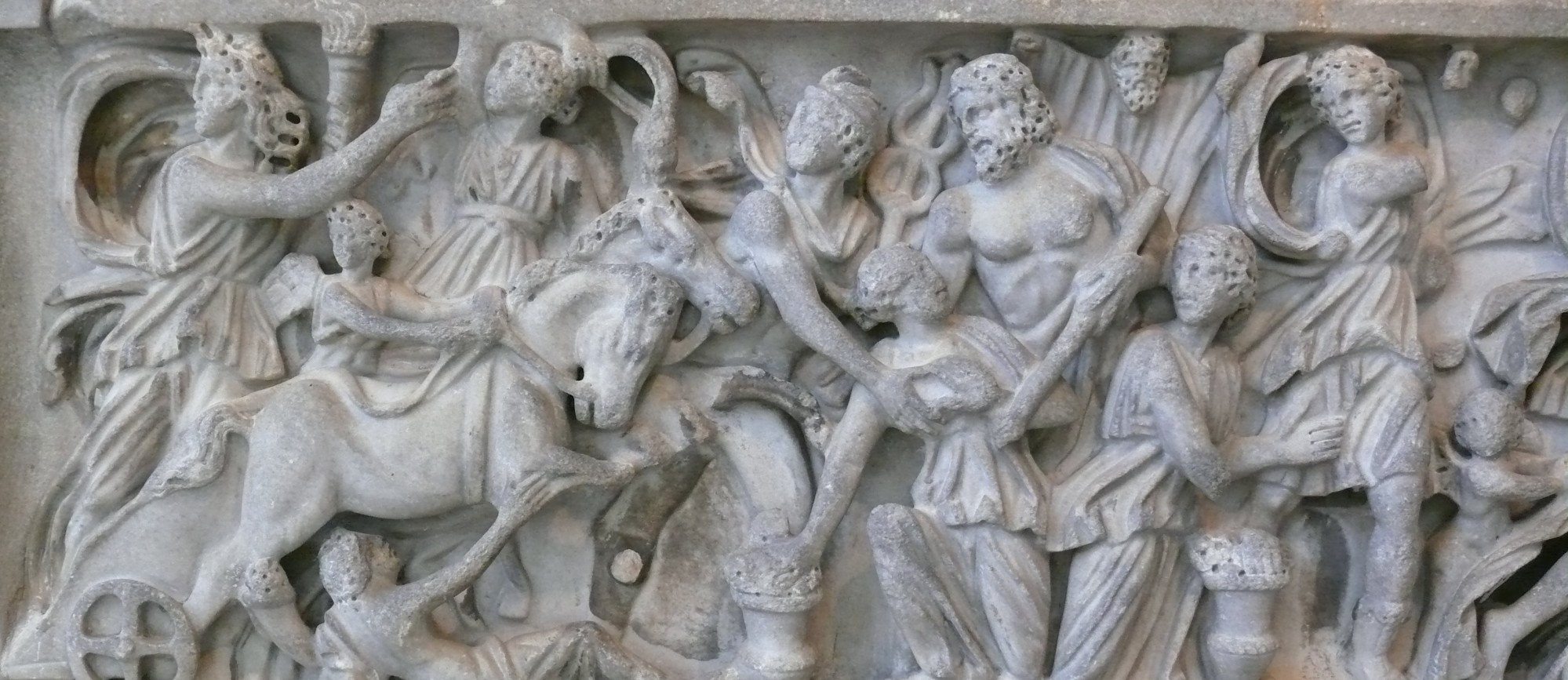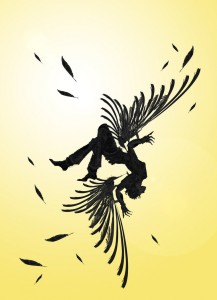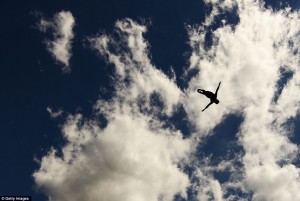 In my AP Literature class in high school, we examined various adaptations of Greek myths throughout time, up to the 21st century. More specifically, we mainly examined literary and artistic adaptations of the myth of Icarus and Daedalus. Although this myth is a relatively short one, I was surprised by the sheer quantity of interpretations and adaptations over the years, from paintings to poems. More surprisingly, each one expanded upon a different minute detail of the original myth, turning it into a completely new and unique work of art. The adaptation I found, and still find, most striking is Edward Field’s adaptation of the myth in his poem Icarus, which describes Icarus’s life if he had survived his fall and come ashore in 20th century society (the poem can be read here).
In my AP Literature class in high school, we examined various adaptations of Greek myths throughout time, up to the 21st century. More specifically, we mainly examined literary and artistic adaptations of the myth of Icarus and Daedalus. Although this myth is a relatively short one, I was surprised by the sheer quantity of interpretations and adaptations over the years, from paintings to poems. More surprisingly, each one expanded upon a different minute detail of the original myth, turning it into a completely new and unique work of art. The adaptation I found, and still find, most striking is Edward Field’s adaptation of the myth in his poem Icarus, which describes Icarus’s life if he had survived his fall and come ashore in 20th century society (the poem can be read here).
At first, I found this concept very odd. Of course Icarus did not survive the fall, and even if he had, why would he have ended up in modern times? How is the classical period of the ancient Greeks even somewhat compatible with present day? However, as I thought more about it, I began to realize that many of the motifs expressed in the original myth continued to be expressed in Field’s adaptation, yet with a twist that fits the character of the modern age. More specifically, the character of Icarus and the symbolism of his fall is inherently tied with human nature. It was not so strange, then, that Field had succeeded in adapting the myth of Icarus to fit present day society.
The defining moment in both the original myth of Icarus and in Field’s adaptation is Icarus’s fall. Traditionally, Icarus and Daedalus escape from prison using artificial wings made from wax and feathers. Daedalus warns his son not to fly too close to the sun, or else the wax will melt. Icarus, however, is so overcome with the feeling of flight that he ignores his father and flies high into the air, where the wax melts and he plummets into the sea. His fall is a direct result of his recklessness and his youthful overestimation of his abilities, as he attempts to become a great hero by flying higher than anybody before him (Graf). Field uses this fall as a turning point in the story. In his adaptation, the archetypal Icarus—the exuberant and daring youth known so well—is replaced with a morose, defeated, and reserved adult after his fall. Icarus is a symbol of youthful rebellion; what, then, is he doing living a monotonous, mundane adult life under the pseudonym of “Mr. Hicks?” (10).
In the traditional myth, his fall is a bittersweet one. It is bitter in that he lets his ambitions get the better of him, yet it is also sweet in that he becomes the hero he was striving to be, if only temporarily. However, he never expects to survive his fall. After the fall, Icarus begins to question whether he really is the hero. How is living a normal life, in which no one knows who you are, heroic? The very concept of the hero is an archaic one—it belongs completely in the legends and mythologies of the past rather than in the news and histories of the present. In a society where the individual is more concerned with maintaining the status quo, such as tending to their “neat front yards” (17), the concept of the hero would seem completely foreign and un-relatable. Thus, Icarus is unable to reveal his true identity. He is doomed to be a hero within the body of an ordinary man, trapped within a society which no longer recognizes him, and—even worse—no longer cares who he is or what he has achieved.
This contrast between the vibrant, lively, and sometimes dangerous life of the past with the uncaring, unexciting, and predictable life of the present is central to Field’s adaptation. It molds Icarus’s character; he asks himself, “What was he doing aging in the suburb?/ Can the genius of the hero fall/ To the middling stature of the merely talented?” (19-21). To Icarus, his life after the fall is completely incompatible with his life before it. He searches for an answer in his books, yet they all claim that “this was a horrible mistake” (18). Icarus, indeed, is a mistake—not only did he critically err in ignoring his father’s advice, but his very presence is a mistake; he is a product of a past time, one that is out of date and out of sync with the present.
In this way, Icarus must feel ostracized, even scorned, by society. Instead of seeking help, he spends his days “in his workshop, curtains carefully drawn,” trying to build a new set of wings so that he can fly again (23). This is reminiscent of his father, Daedalus, a stoic and careful inventor who never finds his place in society; he would be employed by one king, tinkering and making new inventions, then be exiled and work for another, while never truly belonging anywhere (Hyginus). Just like his father, Icarus is exiled to the workshop, trying to invent a way out of his predicament. Here, the roles of father and son are reversed. Icarus shows he has gained the maturity and craftiness of his father, while Daedalus is never mentioned, almost as though he has died in his son’s place.
In the original myth, it is clear how much Daedalus cares for Icarus—he warns his son about the dangers of flying and, when he falls, names the sea below the Icarian Sea after him (Hyginus). Icarus, although seemingly unappreciative of that affection at the time, is completely uncared for and unnoticed after his fall. The society in which he lives is totally unsympathetic—even the police cannot be bothered to investigate the mystery of his death, as they simply “ignore/ The confusing aspects of the case,/…So the report filed and forgotten in the archive read simply,/ ‘Drowned’” (3-7). In this society, no one would even remotely think of normal Mr. Hicks as a hero, and so no one will remember him when he dies.
This is where Field’s poem connects with the heart of the myth. The myth is so enticing because it speaks to the human experience. Everyone, at some point in their lifetime, questions if and how they will be remembered. This question is central to Icarus’s identity. By flying higher than anyone has before, Icarus becomes the hero he has been striving to be, who will be remembered for all time due to his accomplishments. His death only serves to heighten this fame. However, his survival takes away this glory by thrusting him back into a world where no one knows who he is. Through this twist, Field poses this integral question: is it better for Icarus to have failed and be remembered or to survive and be forgotten—another unimportant byproduct of a modern society? And who do we, the readers, want to be—Icarus, who dared to be extraordinary and failed, or his neighbors, who are blissfully ignorant and content with being ordinary in their myopic world? It is easy, even convenient, to brush aside Icarus as just another rebellious child, yet in the end he speaks to something buried deep inside each of us.
Works Cited
Field, Edward. “Edward Field: Icarus.” Cultural Weekly. 17 July 2013. Web. 2 May 2015. <http://www.culturalweekly.com/icarus/>.
Graf, Fritz (Columbus, OH); Kalcyk, Hansjörg (Petershausen). “Icarus.” Brill’s New Pauly. Antiquity volumes edited by: Hubert Cancik and , Helmuth Schneider. Brill Online, 2015. Reference. 02 May 2015 <http://www.paulyonline.brill.nl/entries/brill-s-new-pauly/icarus-e522930>.
Hyginus. “Pasiphae.” Anthology of Classical Myth. Ed. Stephen M. Trzaskoma, R. Scott Smith, and Stephen Brunet. Indianapolis: Hackett Publishing, 2004. 229. Print.

![field[1]](http://pages.vassar.edu/grst-202-52-2015b/files/2015/05/field1.jpg)

